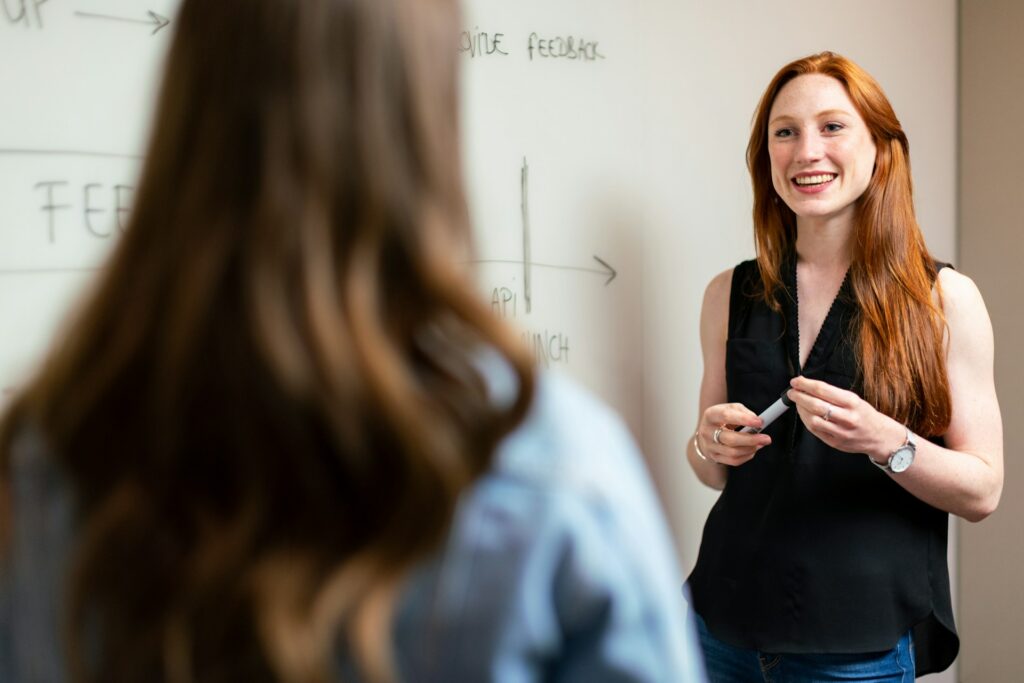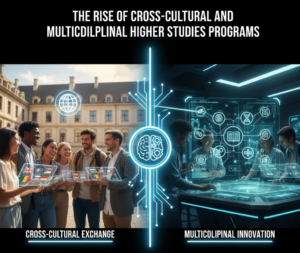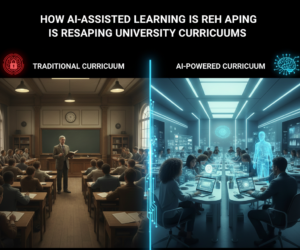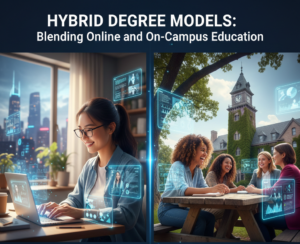The Future of Personalized Higher Education: Artificial Intelligence Tutors Compared to Human Professors

The Future of Personalized Higher Education: Artificial Intelligence Tutors Compared to Human Professors
Technological developments in the fields of artificial intelligence (AI), big data, and adaptive learning are the driving force behind the fast evolution of the higher education environment. The emergence of artificial intelligence (AI) tutors—software systems that have the ability to provide students with education, feedback, and assistance that is tailored to their individual needs—is one of the advances that is most fascinating. Artificial intelligence (AI) presents a novel approach to education that promises efficiency, scalability, and customisation, even though human academics have long been the cornerstone of higher education. The issue that is currently being asked is whether or not tutors that are powered by artificial intelligence are capable of really supplementing or even competing with human instructors when it comes to molding the learners of the future.
1. What Are Artificial Intelligence (AI) Tutors?
Artificial intelligence tutors are computer programs that have been built to simulate certain characteristics of teaching and tutoring. These systems are capable of performing the following functions with the use of machine learning algorithms, natural language processing, and predictive analytics:
- Provide immediate feedback on tasks and tests that are submitted.
- Each student has their own rate of learning, thus classes should be tailored to suit each individual’s speed.
- Find any deficiencies in comprehension and provide tasks that are specifically tailored
- Keep track of participation and provide suggestions for study programs that are tailored to the individual
- Artificial intelligence teachers, in contrast to static online resources, dynamically react to a student’s performance, resulting in an experience that is interactive and dynamic.
2. The Advantages of Artificial Intelligence Tutors in Higher Education
There are a number of advantages to using artificial intelligence (AI) instructors, which may either supplement or improve upon conventional teaching methods:
Personalized Learning at Scale
Human teachers do not have a lot of time for individualized attention. Artificial intelligence tutors have the ability to examine big datasets in order to customize learning pathways for thousands of students at the same time, which makes it possible to guarantee that every student gets education that is designed to address their strengths and limitations.
Immediate Evaluation and Feedback
Artificial intelligence has the ability to evaluate assignments, quizzes, and even drafts of essays in real time, which allows for instant feedback. This speeds up the process of learning and enables pupils to fix their errors before they become deeply entrenched.
Availability Twenty-Four Hours a Day, Seven Days a Week
Artificial intelligence (AI) tutors, in contrast to academics who are limited by office hours, are available to assist students at any time of day or night. They may provide help to students regardless of their time zone or schedule.
Findings Based on Data
Artificial intelligence systems monitor progress and forecast results, which assists instructors in identifying kids who are at danger of falling behind. This enables for intervention to be carried out in a timely manner, which improves overall retention and success rates.
3. The Role of Professors Who Are Human That Cannot Be Replaced
Human teachers continue to be essential for a variety of reasons, notwithstanding the promise of artificial intelligence (AI):
Mentorship and emotional support are both important aspects of personal development.
Artificial intelligence is unable to mimic the direction, encouragement, and mentoring that professors give. The personal connections that students form are beneficial in that they assist them in navigating the problems they face in their personal lives, their academic pursuits, and their career endeavors.
Critical Thinking and Creativity
Structured information is delivered very well by artificial intelligence, but human teachers are better at inspiring critical thinking, debate, and creativity, which are all key qualities for problem-solving and innovation.
Moral and Cultural Context
Education is more than simply the transfer of knowledge; it also encompasses moral reasoning, cultural awareness, and conversations about ethics. Artificial intelligence (AI) does not possess the ability to provide the nuanced insights that human instructors are able to provide.
4. The Future of Personalized Higher Education: Hybrid Models
Universities are increasingly investigating hybrid models, which include combining the use of artificial intelligence (AI) and instructors, rather than perceiving them as rivals.
- Tutoring with the Help of Artificial Intelligence: Professors are able to concentrate on mentoring and the teaching of complicated concepts as artificial intelligence (AI) is responsible for handling monotonous chores.
- Adaptive Coursework: Artificial intelligence (AI) modifies coursework depending on performance, while educators encourage critical conversations.
- Predictive analytics is a technique in which professors use data from artificial intelligence (AI) to develop interventions that are specifically tailored to students who are having difficulty.
- This integration maintains the human aspects that are essential to higher education while simultaneously optimizing productivity.
5. Difficulties and Apprehensions Regarding Artificial Intelligence Tutors
When it comes to the use of artificial intelligence (AI) in higher education, there are obstacles that need to be overcome:
- Data Privacy: There are ethical considerations concerning permission and security that come up when extensive student data is gathered.
- Prejudice in Algorithms: Artificial intelligence systems have the ability to reflect and perpetuate prejudices that are present in the datasets that are used to train them.
- Over-Reliance: Students may grow reliant on advice from artificial intelligence, which has the potential to undermine their autonomous learning and critical thinking skills.
- Access and Equity: Students or institutions who do not have sufficient financial resources may be unable to access advanced AI systems, which would make educational inequity even worse.
- In order to guarantee that artificial intelligence tutors improve higher education rather than impede it, it is essential to address these difficulties.
6. Emerging Examples and Case Studies
Artificial intelligence (AI) instructors are now being implemented at a number of institutions and educational technology (edtech) companies:
- Carnegie Learning: Employs artificial intelligence (AI) to give individualized math instruction that is adaptive, with feedback and tips that are tailored to each student.
- Georgia Tech: Conducted experiments using an artificial intelligence (AI) teaching assistant that was dubbed “Jill Watson.” The purpose of this experiment was to see whether the AI could answer students’ queries that were asked on a regular basis.
- Coursera and EdX: Develop massive open online courses (MOOCs) that include evaluations and learning suggestions that are powered by artificial intelligence.
- The increasing capacity of artificial intelligence to serve as a supplement to conventional teaching approaches is seen in these instances.
7. Implications for the Workforce of the Future
Students may use artificial intelligence (AI) instructors to learn new skills at a quicker rate, in a manner that is tailored to their needs, and in an effective manner. This will enable them to be better prepared for an employment market that is becoming more and more impacted by artificial intelligence and automation. Graduates of higher education institutions who possess both technical expertise and social intelligence may be produced by integrating artificial intelligence (AI)-driven skill-building with human mentoring.
Artificial intelligence tutors are not going to completely replace human professors, but they are changing higher education by making learning more individualized, scalable, and data-driven. There is a high probability that the hybrid system will be the most successful educational model in 2025 and beyond. This approach would allow academics to concentrate on mentoring students, encouraging critical thinking, and providing ethical direction, while artificial intelligence (AI) would take care of monotonous chores and analytics. A learning environment that is both effective and truly human may be created by working together, artificial intelligence and human instructors can ensure that students flourish both intellectually and personally.




